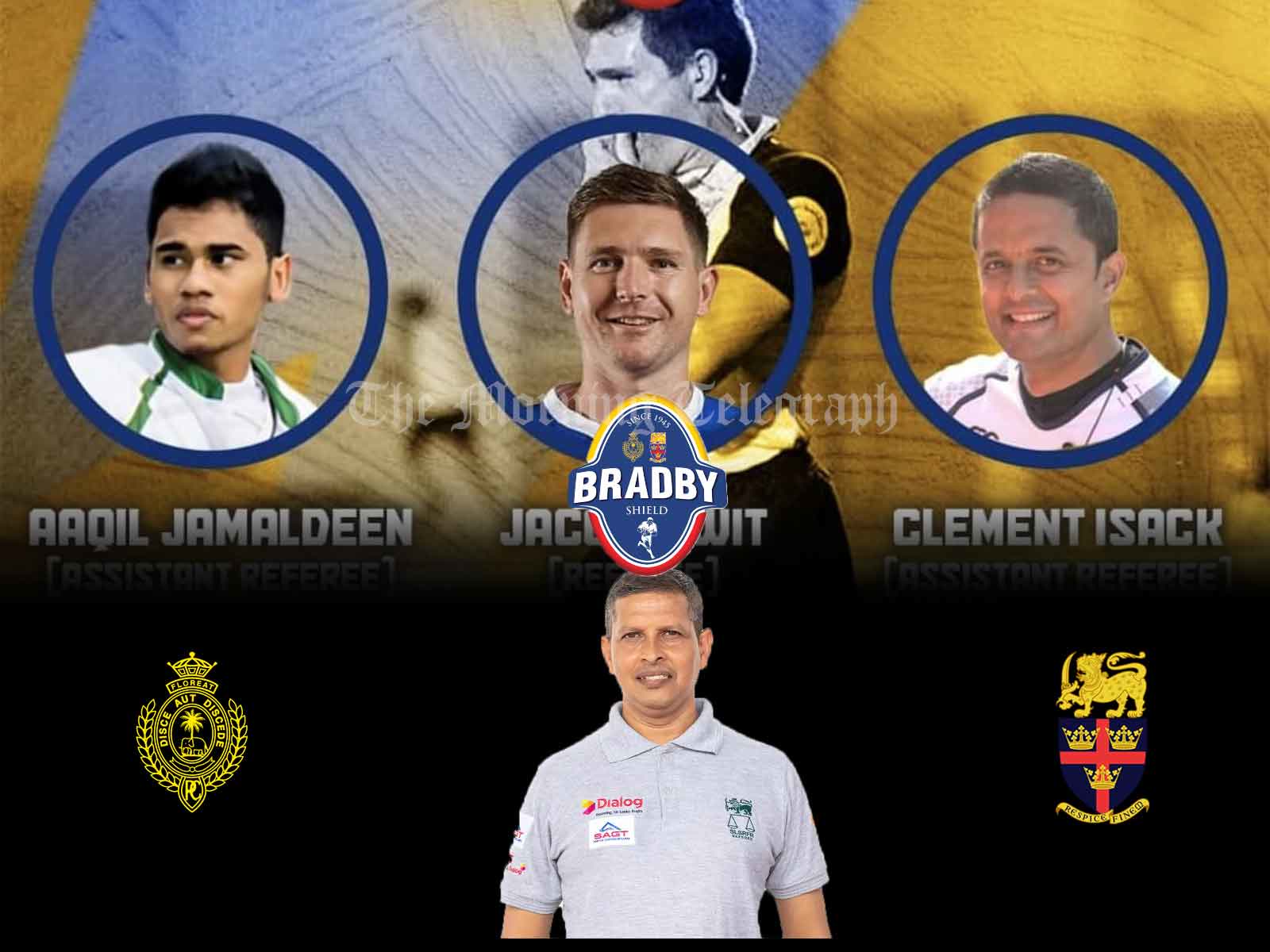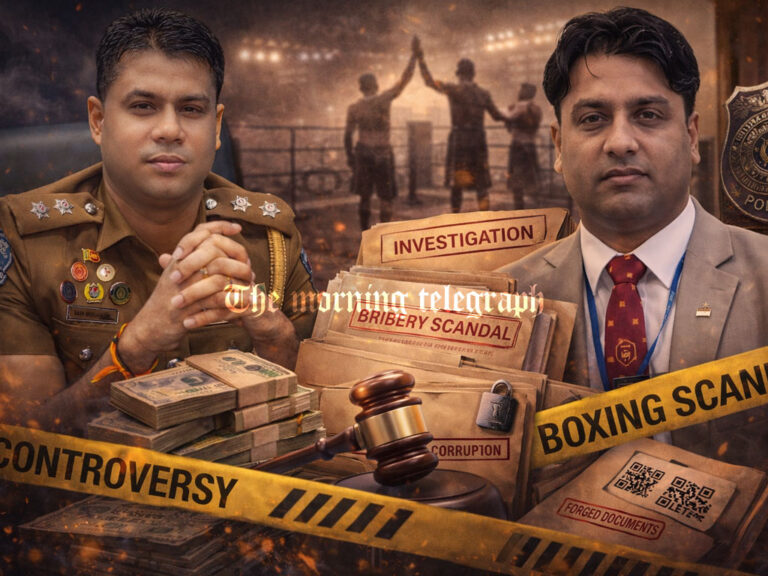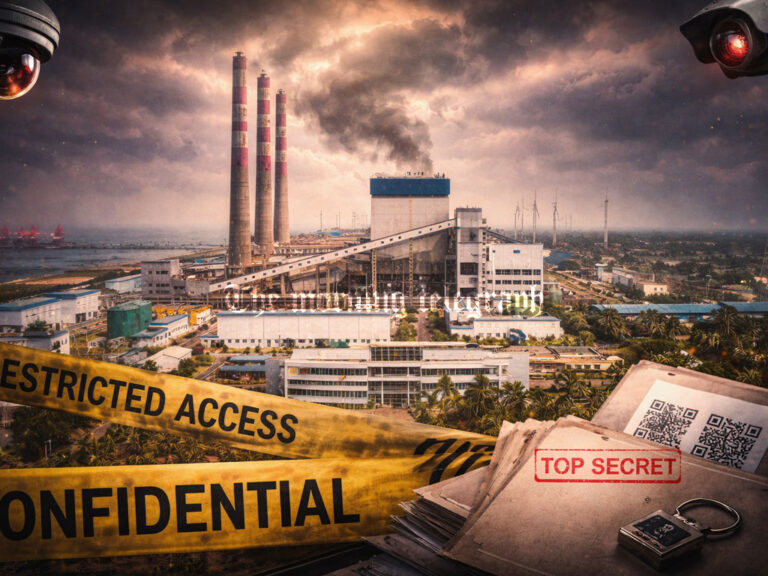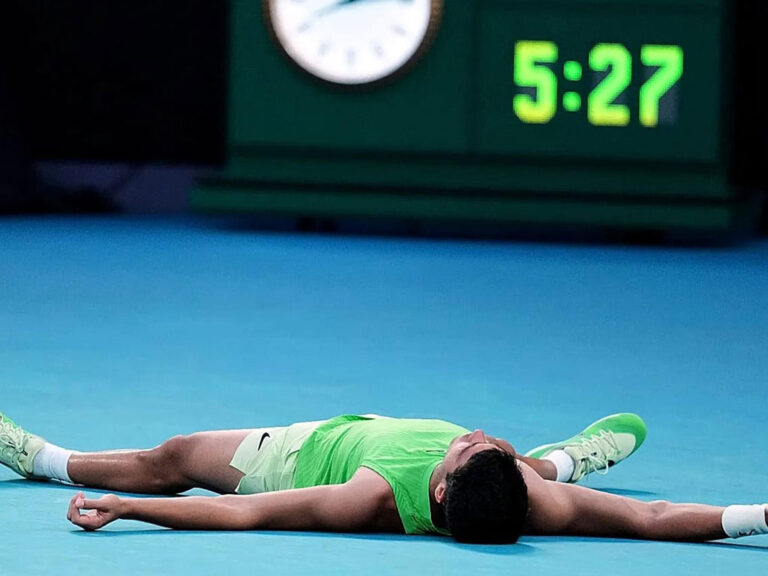
- Glaring errors by foreign Match Officials that went unnoticed
- These errors could greatly affect the final outcome at the end of the second leg
The organizing committee made a decisive move by ensuring that the 78th Bradby Shield first leg contest between Royal College and Trinity College was officiated by match officials flown in from overseas, deliberately excluding officials from the Sri Lanka Association of Rugby Football Referees (SLARFR) for reasons that is now common knowledge.
The last time a foreign referee was brought in for the Bradby Shield was in 2011, when South African Jonathan Kaplan officiated the leg played in Pallekele, Kandy. This year, the match was once again overseen by a South African, Jaco De Wit, along with Assistant Referees Aqueel Jamaldeen (an Old Royalist) and Clement Isaac (an Old Trinitian), all based in the United Arab Emirates.
While many social media platforms praised the match officials for allowing the game to flow smoothly without issuing yellow or red cards for committing blatant errors virtually ignored by the match officials on the field of play. These decisions could potentially influence the final outcome of the Bradby Shield, as the winner is determined by the total points scored over the two legs. For example, Trinity was denied 2 points when a conversion of a try was unsuccessful. In all honesty if the laws were applied seven points would have been awarded straightway for what seemed a penalty try after a Royal player tackled the Trinitian try scorer when he was collecting the ball mid-air. Another questionable call was a penalty kick by a Royalist that appeared to have missed the right upright but nevertheless was awarded 3 points. These crucial five points could eventually make a huge difference when the ultimate winner is announced based on the aggregate of points collected over the two legs that are played.
Despite Trinity College narrowly winning the first leg in Colombo by a slim margin of 17-16, the match sparked much debate across various social media platforms.
One of the most active platforms is a WhatsApp group named “Rugby Cric Hub,” which includes several prominent rugby personalities and consists of former players, media personnel, sponsors, and even current members of the Sri Lanka Association of Rugby Referees.
A key figure in this group is Dinka Peiris, the current President of the Sri Lanka Association of Rugby Football Referees.
After closely reviewing the match footage, Peiris made several observations and shared them in the forum, inviting candid feedback and opinions. He emphasized that his analysis was meant to be educational, seeking input from commentators who had previously made comments, perhaps without full knowledge of the incidents.
Many believe that Dinka Peiris’ post was not motivated in any way or form especially after the local referees were excluded from officiating the match. Many believe that it is a well-conducted post-match analysis of certain events that took place during the game.
The Rugby Cric Hub
The following was posted by the President of the Sri Lanka Association of Rugby Football Referees:
“With all due respect to everyone in this group, I, as a member and an ordinary person, would like to share my thoughts, just like the 34 others who have commented so far about the match on Saturday.
Firstly, I want to congratulate the referee and his team for an outstanding job on August 24, 2024, at the Royal Sports Complex. I also want to congratulate Trinity College for winning the first leg in Colombo and inviting Royal College to the lion’s den for the second leg, with the opportunity of retaining the shield for another successful year.
I took the time to read all the comments from members of this forum who expressed their opinions and praised the referee and his team’s management of the game. There were no cards issued, no referrals to the TMO, even though the facilities were available, and the referee himself acted as the TMO, a first in the world, making Sri Lanka proud to have hosted such a match. The crowd was respectful, with no shouting at the referee, no black-clad enforcers, and no reliance on the assistant referees for input.
I also noticed comments about errors, such as a knock-on try, a missed conversion, and a penalty try, along with suggestions for our Sri Lankan referees to learn from this gentleman’s example. As an ordinary person, I recognize that the 34 members who commented are knowledgeable and experienced in making judgments, interpreting WR laws, and applying them.
Therefore, as a fellow Sri Lankan, I would like to ask for your input to help me learn and assist my panel of Sri Lankan referees in improving their game management in the future.
I will share a few clips and comments to seek your feedback. My post is purely for educational purposes, with the utmost respect for the match officials on that day, and without any malice.
Let’s set aside who won or lost and any affiliations, such as being an old boy or a member of any society or club.
My intention is to approach this positively, as I aim to learn from all of you experts.”
Clip 1:
Based on the comments in this forum, it seems that the consensus is that this incident required no action, at most, a yellow card or a penalty try. If that’s the case, then we should convey to our Sri Lankan referees that they should handle similar situations in the future without strictly adhering to World Rugby Law 9.17. We need to give them the confidence that we won’t criticize them for it, even though we may have done so in the past.
Do you still believe this approach is correct? Isn’t it an error?
Considering that the TMO facility was available (even though the referee was also acting as the TMO), wouldn’t it have been prudent for him to take advantage of it, taking the time and space to ensure his judgment was accurate?
Additionally, since he had assistant referees (not just touch judges), he had another option to consult with them before making a decision. What’s your view on this? Or are we okay with local referees not following WR Law 9.17 from now on?
Clip 2:
So, based on the comments in this forum, it appears that the consensus is that this type of play should only result in a penalty, with no need for a yellow or red card. If that’s the case, then are we now suggesting that WR Law 9.12 should be ignored in the future?
As members of this forum, we need to ensure that we don’t criticize our local referees if they choose not to issue a red card in similar situations.
As for me, this incident warrants a red card, as World Rugby sanctions such incidents with a minimum of a two-week suspension.
Do you still think the decision was correct, or isn’t this an error? Given that the TMO facility was available (even though the referee was also acting as the TMO), wouldn’t it have been better to use that option, taking the necessary time to ensure the judgment was accurate?
Additionally, since there were assistant referees (not just touch judges), wouldn’t consulting them before making a decision have been another viable option? What’s your perspective on this? Or are we okay with local referees not following WR Law 9.12 going forward?
Clip 3:
An RC player received the ball off a kick from TCK just 2 meters in front of the 22-meter line. He ran and kicked the ball about 5 meters past the 22. The referee, noticing an RC player in an offside position at the far end, tried his best to signal “STOP, STOP” (which I think our referees should adopt), and then awarded a penalty kick at the spot where the player was offside. However, he offered the penalty kick 5 meters from the 50-meter mark.
So, does this forum now agree that local referees should no longer need to call or give the option to the non-offending team and should instead go straight to awarding the penalty kick where the offside player was? According to WR Law 10.4 C, the referee is supposed to ask or offer the non-offending team the option, which could result in either a scrum where the RC player kicked the ball or a penalty kick where the offside occurred. If TCK had chosen the scrum, it would have been near the 22-meter line, but they opted for a lineout because no option was offered.
Do you still believe this decision was correct, or isn’t it an error? Where was the assistant referee in this situation shouldn’t they have helped the referee make the right call? What’s your view? Or are we okay with local referees ignoring WR Law 10.4 C from now on and not offering options in such situations?
Clip 4:
Based on your comments, it seems this forum agrees with the decision made by the two assistant referees and the final call by the referee that the conversion was successful. But was it really? Didn’t it raise some doubt? Considering the TMO facilities were available, it seems like the referee should have used them, as I mentioned in clips 1 and 2.
This forum has been vocal about the importance of using technology, but did the referee actually utilize it?
This situation feels eerily similar to the HSC vs Army match, doesn’t it? In that case, the SLR executive committee and council unanimously decided to cut the assistant referees’ match fees by 50%.
Even after the end of colonial rule in many Asian countries, the lingering effects of colonization continue to shape mindsets. This colonized mentality, where people still perceive the white man as superior, persists in various aspects of life. Many individuals believe that everything a white person says or does is inherently right, often valuing Western opinions, standards, and practices over their own. This deeply ingrained belief system, a remnant of colonial influence, continues to undermine self-confidence and cultural pride, perpetuating a sense of inferiority long after the colonizers have left.
In the end, one truth stands clear: regardless of whether you’re white, black, brown, or yellow, we’re all human, and it’s evident that everyone is capable of making mistakes.
Overall, this analysis could be valuable for the three match officials namely Referee Jaco De Wit and Assistant Referees Aqueel Jamaldeen and Clement Isaac, as it offers insights that could help further refine their skills as match officials.





The points raised by Dinka are noteworthy, but Dinka should have made similar studious analyses of the local refs all this while.
If he did, it would have been SO SO educational.
Lets await his similar analyses and theses on performances of the Referees Association controlled games.
He talks of colonial mentality.
Hmm.
What a Rugby worthy comment!
Being the head of the Sri Lanka Association of Rugby Football Referees Dinka Peiris was furious that both Royal and Trinity refused to go ahead with his local Referees after some blunder calls they made during the league matches and he refused to give a TMO for the Bradby 1st leg which made the Referee becoming TMO in the Bradby 1st leg. First of all being the head of the Local Refs he should have never become the TMO in school matches which he did no matter and even overturned the decisions made by the referees by just giving instructions over the mic by sitting outside the match. He made blunder calls for Yellow and Red cards where in the first place there should not have been any card at all. Dinka Peiris did a shitty job this whole season and he is not capable enough the continue as the President of SLARFR going forward.
Dinka shows his lowest standard. He doesn’t know what he has to work on. He has no Rugby background and talks like a World Rugby Guru. He doesn’t deserve to be on the post where he is right now and not worthy to be a Referee. Dinka is truly a Jinka with a skirt on.
My personal opinion is that those who have played rugby at the highest level should come forward to become refrees. otherwise, people like Dinka who have not played rugby will continue to sit in the upper chairs. Dilroy fernando and Jamaldeen can be called as the best example. They have even led the national team and have a reputation as top international level refrees. The players played at A division level should come forward for the refreeing for A division level.
The referees were appalling!
They even made Dinka Pieris and our local lot look like rock stars.
Trinity was offside on numerous occassions and slowing the rucks deliberately a couple of times which the author fails to mention…
But a $#!T show in general!
Regarding the Penalty Try or not:
In rugby union, if an infringement is committed by the defending team while the attacking team is scoring a try, the referee may award a penalty try instead of just the try. A penalty try is awarded if the referee believes that a try would have been scored if not for the illegal action by the defending team. This typically occurs when an infringement directly prevents a try from being scored, such as a high tackle or collapsing a maul near the try line.
When a penalty try is awarded, it is automatically worth 7 points, and there is no need for a conversion attempt. The defending team may also receive additional penalties, such as a yellow card or a sin-bin for the player responsible for the infringement.
However, if the infringement does not directly prevent a try from being scored, but the try is still scored despite the infringement, the referee may simply award the try and then apply any additional sanctions (e.g., a yellow card) separately. In this case, the try would be worth 5 points, and the conversion attempt would follow as usual.
Where is Dinka when almost all key matches were messed up by his team of incompetent referees?
BTW the decline was excellent by the players, this is directly a reflection of the vibe the referees bring to the game.